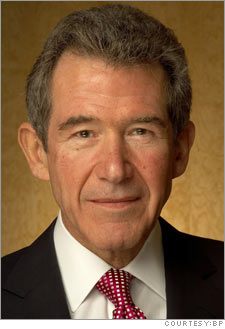The final days of BP's John BrowneOnce hailed as a renegade "green" oilman, Lord Browne has seen his reputation go up in smoke. Fortune's Nelson Schwartz documents the CEO's downfall.LONDON (Fortune) -- For a CEO whose PR skills were pitch-perfect for so long, it was a terribly ironic denouement. Just days after announcing he would retire 18 months earlier than planned, BP's John Browne appeared by video link before reporters in Houston Tuesday to respond to the findings of an outside panel investigating the explosion at BP's Texas City refinery in 2005, which killed 15. The panel, appointed by BP (Charts) itself and chaired by former Secretary of State James Baker, was devastating in its criticism of Browne and BP, and the press conference was just as unsparing.
Lord Browne of Madingley, as he is formally known, was long the most articulate and media-friendly Big Oil exec. But he was pummeled by the reporters who once celebrated him as the 'Green' oilman, who was so different from more traditional types like former Exxon (Charts) boss Lee Raymond. One reporter even suggested Browne was to blame for the problems at BP's Thunder Horse deepwater oil platform in the Gulf of Mexico, although its near-collapse was caused by Hurricane Dennis in the summer of 2005, not any man-made force. Browne insisted his decision to retire early wasn't spurred by the report, which faulted the company's "short-term focus" in its U.S. refining operations and a lack of emphasis on "process safety." Browne says he decided to step aside in early December to remove uncertainty about the transition and clear the way for longtime lieutenant Tony Hayward, but Browne's legacy as an environmentally-aware oilman has seemingly gone up in smoke. And the ironies go beyond PR. Indeed, while Lee Raymond dismissed even the existence of global warming and wasn't afraid of cutting off critics in mid-sentence, Browne's company lost its way on the very subject Raymond and Exxon held most sacred: safety. (Exxon even starts its analyst meetings with an announcement of safety procedures.) What's more, while Raymond stayed on for several years longer than expected and beyond Exxon's normal retirement age of 65, Browne will depart early at age 60. What's more, even as Browne quits amid criticism, Raymond's successor Rex Tillerson is quietly moving Exxon's stance on global warming and other environmental issues in the direction BP and Browne staked out years ago. But no one in Houston Tuesday wanted to hear about how BP's greenhouse gas emissions are down 20% from 2000, even though Browne managed to mention it at the press conference. Instead, the words everyone will remember from Browne are these: "If I had one thing which I hope you will all hear today it is this, 'BP gets it.' And I get it too. This happened on my watch, and as chief executive, I have a responsibility to learn from what occurred." BP has already said it would implement the Baker Panel's recommendations; the company's statement can be found here. Indeed, that may be the final irony: James Baker put this report together, even as he oversaw the report recommending a change in strategy in Iraq. Baker's Iraq advice has gone by the wayside for now, but BP and Browne didn't have any choice but to listen to him this time. --------------------------------------------------------- |
|

